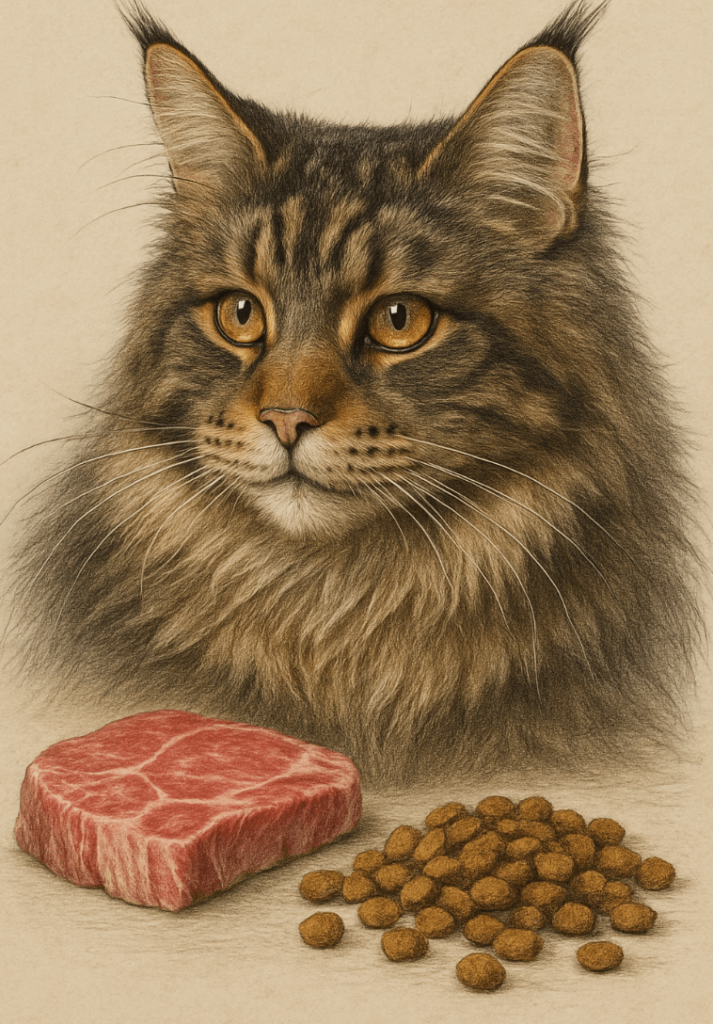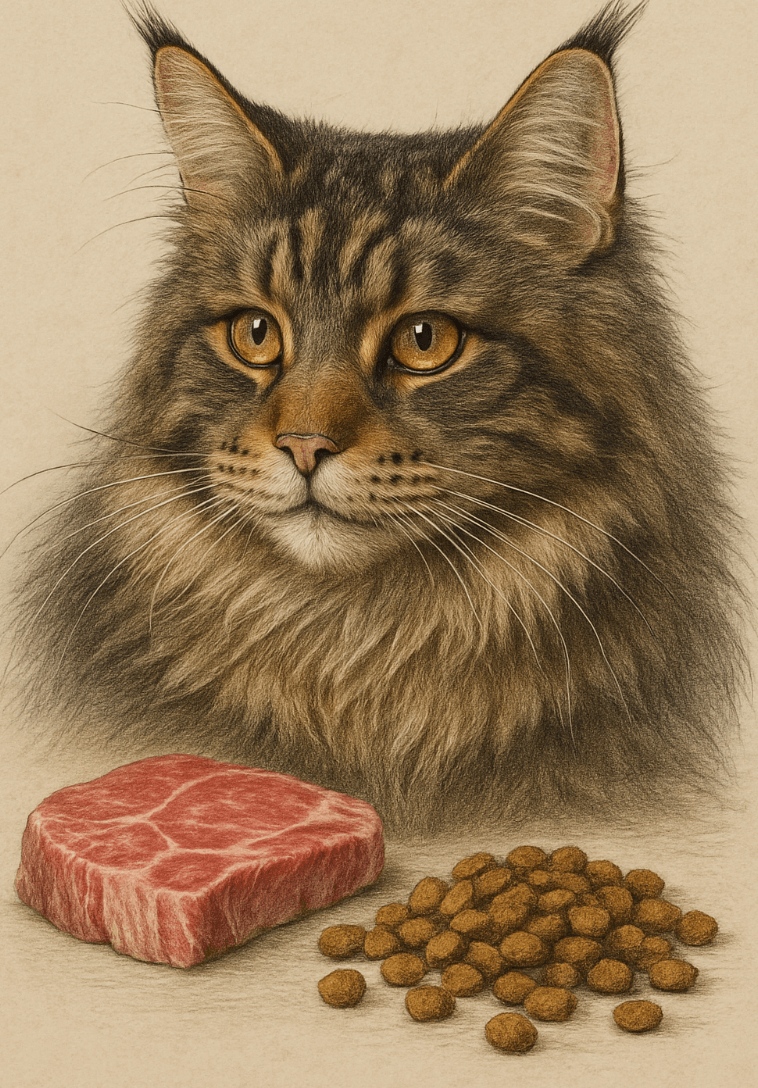What Do Maine Coon Cats Eat? A Guide to Feeding Your Gentle Giant
Maine Coon cats, known for their impressive size, luxurious fur, and friendly personalities, are a beloved breed among cat enthusiasts. However, their unique needs extend beyond cuddles and playtime—proper nutrition is essential to keep these gentle giants healthy and thriving. As obligate carnivores, Maine Coons require a diet rich in high-quality protein, balanced fats, and essential nutrients. But what exactly should you feed your Maine Coon to ensure they stay strong, energetic, and happy? In this blog post, we’ll explore the best foods, feeding tips, and dietary considerations to help you provide the ultimate care for your feline companion.
Essential Nutrients for Maine Coon Cats
To maintain their health and vitality, Maine Coon cats need a diet that meets their specific nutritional requirements. Here’s a breakdown of the key nutrients they need and why they’re important.
High-Quality Protein:
Protein is the cornerstone of a cat’s diet, supporting muscle development, tissue repair, and overall energy levels. Look for animal-based proteins like chicken, turkey, or fish.Healthy Fats:
Fats provide energy and support skin and coat health, which is especially important for Maine Coons due to their thick, long fur. Sources like salmon oil or flaxseed are excellent options.Taurine:
This essential amino acid is critical for heart health, vision, and immune function. Maine Coons, like all cats, cannot produce taurine on their own, so it must come from their diet.Vitamins and Minerals:
Nutrients like vitamin E, vitamin A, and zinc support immune health, bone strength, and skin integrity, ensuring your Maine Coon stays robust and resilient.Hydration Through Wet Food:
Maine Coons can be prone to dehydration, so incorporating wet food into their diet helps them stay hydrated and supports kidney health.
Providing a balanced diet with these nutrients ensures your Maine Coon thrives both physically and mentally.
Best Foods for Maine Coon Cats
Choosing the right food is crucial for meeting the dietary needs of your Maine Coon. Here are some top options to consider when planning their meals.
High-Protein Dry Kibble:
Opt for premium dry food formulated for large breeds, ensuring it contains at least 30% protein and limited fillers like corn or soy.Wet Canned Food:
Wet food not only provides hydration but also offers a variety of flavors and textures that Maine Coons enjoy, such as chicken, beef, or seafood blends.Raw or Freeze-Dried Diets:
Some owners prefer raw diets or freeze-dried alternatives, which mimic a cat’s natural prey-based eating habits and are packed with nutrients.Homemade Meals:
If prepared correctly, homemade meals using ingredients like cooked chicken, eggs, and vegetables can be a nutritious option, though veterinary guidance is recommended.Supplements for Coat Health:
Adding omega-3 fatty acids or fish oil supplements can enhance their glossy coat and reduce shedding.
These food choices cater to the unique dietary preferences and needs of Maine Coon cats, keeping them satisfied and healthy.
Check this guide 👉Maine Coon Ears: Best 7 Expert Tips!
Check this guide 👉Siamese Maine Coon Mix: Best 7 Expert Tips!
Check this guide 👉Are Maine Coon Cats Hypoallergenic? Best 7 Expert Tips!

Benefits of a Balanced Diet for Maine Coons | Risks of Poor Nutrition |
|---|---|
Supports muscle growth and maintenance | Risk of obesity from high-calorie, low-protein diets |
Promotes a shiny, soft coat | Increased shedding and dull fur from nutrient deficiencies |
Enhances immune system function | Higher susceptibility to infections and illnesses |
Prevents urinary tract issues | Risk of kidney stones or bladder problems |
Maintains healthy weight and energy levels | Lethargy and poor mobility due to imbalanced nutrition |
Feeding Tips for Maine Coon Cats
Proper feeding practices go beyond just choosing the right food. These tips will help you establish a routine that keeps your Maine Coon healthy and content.
Follow Portion Guidelines:
Maine Coons are large cats, but overfeeding can lead to obesity. Stick to portion sizes recommended by your vet or food manufacturer.Feed Small, Frequent Meals:
Instead of one large meal, offer two to three smaller meals throughout the day to aid digestion and energy distribution.Monitor Water Intake:
Encourage hydration by providing fresh water at all times and considering a cat water fountain to entice drinking.Introduce New Foods Gradually:
Sudden dietary changes can upset their stomach. Mix new food with old food over a week to ease the transition.Avoid Toxic Foods:
Keep harmful human foods like chocolate, onions, garlic, and grapes out of reach to prevent accidental poisoning.
By following these practices, you can ensure your Maine Coon enjoys a consistent and safe feeding routine.
Signs Your Maine Coon’s Diet Needs Adjustment
Even with the best intentions, dietary mistakes can happen. Watch for these signs that indicate your Maine Coon’s diet may need tweaking.
Excessive Weight Gain or Loss:
Sudden changes in weight can signal an imbalance in calories or nutrients, requiring a vet consultation.Dull or Patchy Coat:
A lackluster coat often points to insufficient protein, fats, or vitamins in their diet.Frequent Hairballs:
While occasional hairballs are normal, too many may indicate inadequate fiber or hydration.Lethargy or Irritability:
Low energy or mood swings can result from poor nutrition or insufficient calories.Digestive Issues:
Diarrhea, vomiting, or constipation may stem from food sensitivities or an unbalanced diet.
Recognizing these signs early allows you to make adjustments and restore your cat’s health.
Common Mistakes to Avoid When Feeding Maine Coons
Even experienced cat owners can make mistakes when feeding their Maine Coons. Avoiding these pitfalls ensures your cat stays healthy and happy.
Overfeeding Treats:
Too many treats can lead to weight gain and nutritional imbalances. Limit treats to no more than 10% of their daily caloric intake.Ignoring Age-Specific Needs:
Kittens, adults, and senior Maine Coons have different dietary requirements; always choose food appropriate for their life stage.Neglecting Hydration:
Maine Coons are prone to urinary issues, so failing to encourage water intake can lead to health problems.Skipping Regular Vet Check-Ups:
Routine vet visits help monitor your cat’s weight, diet, and overall health, catching issues before they worsen.Using Low-Quality Food:
Cheap, filler-heavy food lacks the nutrients Maine Coons need, potentially leading to long-term health issues.
Avoiding these mistakes sets the foundation for a well-fed and thriving Maine Coon.
Alternative Protein Sources for Maine Coons
While traditional proteins like chicken and fish are popular, exploring alternative protein sources can add variety to your Maine Coon’s diet.
Venison:
Lean and hypoallergenic, venison is an excellent option for cats with food sensitivities.Duck:
Rich in iron and flavor, duck provides a unique taste experience while delivering essential nutrients.Lamb:
High in protein and healthy fats, lamb supports muscle development and coat health.Quail:
Small yet nutrient-dense, quail is a novel protein source that many Maine Coons find irresistible.Rabbit:
Low in fat and highly digestible, rabbit is ideal for cats with sensitive stomachs or allergies.
Incorporating these proteins keeps meals exciting and nutritionally diverse.
Seasonal Treat Ideas for Maine Coons
Occasional treats can be a fun way to bond with your Maine Coon while celebrating the seasons. Here are some safe and seasonal ideas to try.
Spring: Fresh Herbs (Catnip or Cat Grass):
Offer small amounts of cat-safe herbs to stimulate their senses and aid digestion.Summer: Frozen Tuna Cubes:
Blend cooked tuna with water, freeze in ice cube trays, and serve as a refreshing summer snack.Fall: Pumpkin Puree:
Plain, unsweetened pumpkin aids digestion and provides fiber; mix a small amount with their food.Winter: Warm Chicken Broth:
Serve a teaspoon of low-sodium, chicken-based broth to warm them up on chilly days.Year-Round: Homemade Meat Balls:
Cook bite-sized meatballs using lean ground turkey or chicken, ensuring no added salt or spices.
These treats add variety and joy to your Maine Coon’s diet while keeping them safe and healthy.
Frequently Asked Questions About Maine Coon Cat Nutrition
Can Maine Coons eat dry food only?
Yes, but it’s better to combine dry food with wet food to ensure proper hydration and variety.
How much should I feed my Maine Coon daily?
Adult Maine Coons typically need 200-300 calories per day, divided into two or three meals, depending on their activity level.
Are there foods Maine Coons should avoid?
Yes, avoid toxic foods like chocolate, caffeine, alcohol, and anything containing artificial sweeteners like xylitol.
Is a raw diet safe for Maine Coons?
A raw diet can be safe if prepared correctly, but consult your vet to ensure it’s nutritionally complete and free of pathogens.
Why is my Maine Coon always hungry?
Maine Coons have hearty appetites due to their size and energy needs, but constant hunger could indicate boredom or an imbalanced diet.
Nourishing Your Maine Coon for a Happy, Healthy Life
Feeding your Maine Coon the right diet is one of the most important ways to show love and care. By understanding their nutritional needs, choosing high-quality foods, and following smart feeding practices, you can ensure your gentle giant enjoys a long, vibrant life. Remember, every Maine Coon is unique, so tailor their diet to suit their individual preferences and health requirements. With proper attention to their meals, your feline friend will thrive as the majestic, affectionate companion they’re meant to be.
Dog Tapeworm Life Cycle: Best 7 Expert Tips! – Learn how tapeworms infect dogs, spot symptoms, and break the cycle with expert prevention strategies.
Anxious Cat Body Language: Best 7 Expert Tips! – Learn to spot signs of stress, understand triggers, and help your cat feel safe and relaxed.
Anxious Dog Body Language: Best 7 Expert Tips! – Learn to spot signs of anxiety, respond effectively, and help your dog feel safe and secure.
Is Breeding Dogs Bad? Best 7 Expert Tips! – Explore the ethics, benefits, and risks of dog breeding to make informed decisions for a better future.





